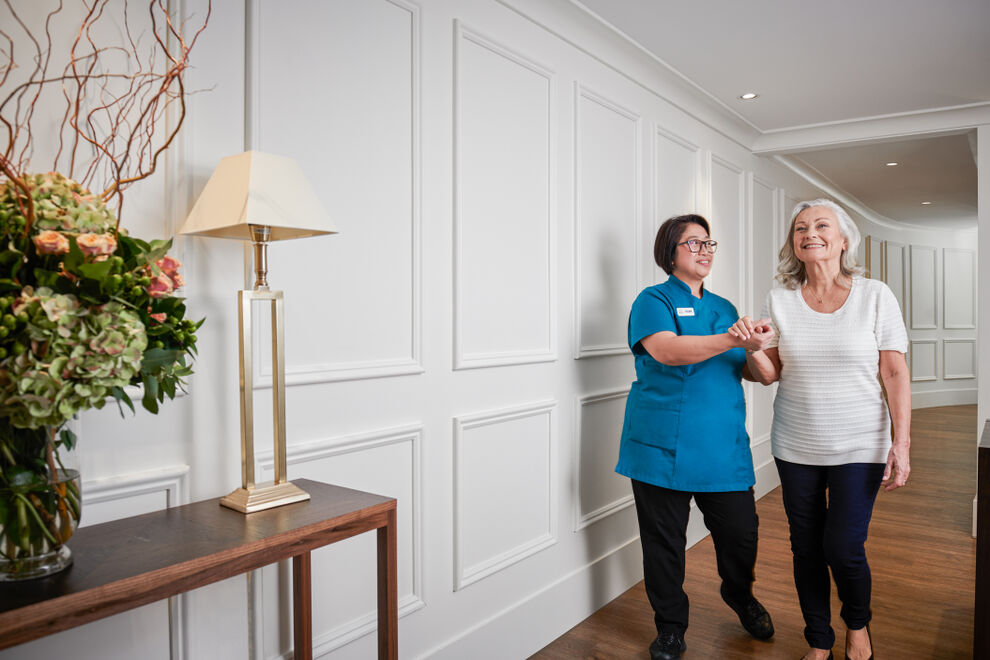Managing frailty in the home

Frailty is a huge concern amongst the elderly. It’s a natural part of ageing that can have debilitating consequences on quality of life, overall health and wellbeing and increase vulnerability and susceptibility to illness. One in four people aged 85 years and over is living with frailty in the UK causing fatigue, reduction in strength, unintended weight loss and a compromised immune system, making it harder to recover from illness.
Being frail in later life increases the risk of falls, reduced mobility, disability and hospital visits. Apart from the natural ageing process, other causes of frailty can include a decrease in appetite, reduction in lean body mass, immobility and/or a sedentary lifestyle, depression and cognitive impairment such as dementia.
If left unidentified, frailty can quickly accelerate and become dangerous, therefor prevention and management are key in optimising health and wellbeing. Loveday’s care team offer tips and advice to help identify, prevent and manage frailty in the elderly:
Identify the key signs of frailty:
It’s important to understand some of the key red flags of frailty in order to identify them quickly and take measures to address the condition. Some of the key indicators can include:
- Sudden and unexpected weight loss (5kg or more in a year)
- Exhaustion and fatigue
- Weakness throughout the body
- Reduced ability to perform seemingly normal daily tasks
- Low levels of physical activity
- Walking at a very slow pace
Prevention and Management of Frailty
There are many things we can do as part of our regular, daily lives to help prevent frailty. The earlier we start the better!
Eat fresh and regularly – Have regular meals throughout the day, even if it’s smaller portion sizes, to prevent dips in blood sugar levels that may cause faintness or dizziness. Appetite can decline later in life partly because we’re not so active but also because we may forget to eat. It’s important to eat fresh, nutritionally dense food to optimise our health.
Be active – Go for regular walks or to take up a gentle exercise class like Tai Chi (which can improve balance) or yoga to improve flexibility. There are many online fitness classes for seniors including chair workouts which are easy to follow and very inclusive.
Try weight-bearing exercise – Weight-bearing exercise which increases bone density and therefore reduces the risk of developing osteoporosis, where bones become more brittle and can break more easily. Walking, jogging or bodyweight exercises such as basic squats or armchair dips are all a good idea. Using hand weights or light dumbbells will also improve bone density.
Stay hydrated – Dehydration can cause confusion, headaches and dizziness. If you are caring for a loved one, make it easy for them to drink regularly – provide drinks in easy-to-hold beakers and make sure they always have access to a jug of water.
Try to avoid long periods of sitting – Being sedentary for long periods of time can cause a person to become frail. Even if you can’t walk or exercise for very long, getting up and moving around regularly, even if it’s just for a few minutes, is better than sitting still all day.
Remove household hazards that could cause accidents – remove slippery rugs, worn carpets or clutter from your house that can increase the risk of trips and falls. Make sure lighting in rooms is good and avoid dimly lit areas.
Make the toilet accessible – keep the bedroom free from obstacles that could cause bumps or falls. Ensure the path to the toilet is lit with a night light in the evening.
Adapt your home – speak with an occupational therapist or the team at Loveday at Home about any adjustments that can be made to your home to avoid falls, such as a rail for the stairs, or ask about items like walking aids and shower stools to prevent falls. The team can also offer invaluable lifestyle advice regarding fitness, nutrition and activities in the home to improve strength and reduce the risk of the onset of frailty.
Published: 12th of August 2021 by Loveday & Co
Tagged: Dementia

